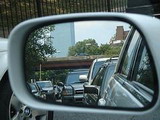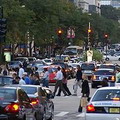 針對溫室氣體的控管,布希政府11日提出在現有聯邦法律下可能採取的諸多措施,且開放進行公眾評論,但也表態強調政府並未打算推動其中任何一項行動。這項聲明證實布希政府將不會進行溫室氣體的規範,而是把壓力丟給下任總統與國會。
針對溫室氣體的控管,布希政府11日提出在現有聯邦法律下可能採取的諸多措施,且開放進行公眾評論,但也表態強調政府並未打算推動其中任何一項行動。這項聲明證實布希政府將不會進行溫室氣體的規範,而是把壓力丟給下任總統與國會。
美國環保署11日所公布的「立法預先公告」(the advanced notice of proposed rulemaking),是為了回應最高法院在2007年4月做出的歷史性裁決,其中認定二氧化碳為污染物,並賦予環保署權責,可根據「清淨空氣法案」(Clear Air Act)對這種主要溫室氣體進行控管。
究竟車輛的溫室氣體排放是否對公共健康造成危害,環保署之前不願做出判定,因此最高法院也在裁決中要求,環保署必須重新考慮就此問題進行評估。倘若「危害屬實」,則環保署必須在清淨空氣法案的規定下,對排放加以控管限制。但布希政府一直明顯迴避問題,並拒絕以清淨空氣法案規範排放的提議。
在環保署公布的冗長文件裡,有長達1千多頁的內部討論與其他政府單位的意見,重點只為釐清是否可以用清淨空氣法案來規範發電廠與車輛等各種溫室氣體排放源 。
環保署長強森(Stephen Johnson)表示,清淨空氣法案完全「不適用」於規範溫室氣體,這份複雜的文件重申了他的立場。強森指出,想要規範溫室氣體,「不論用清淨法案的任何一條規定來進行,都會造成環保署空前的擴權,對經濟活動和民眾生活的每個層面帶來嚴重的影響。」
強森也解釋,如果環保署要依法進行減排,勢必進度緩慢,制定每條規定都要曠日費時,甚至還要進入漫長的訴訟程序。他表示,「如果我們想要認真規範溫室氣體,清淨空氣法是錯誤的工具。真正擁有恰當權力的是國會。」
但是美國國會目前為止的表現也乏善可陳。參議院6月份曾試圖推動相關法案,卻被口水戰淹沒而失敗,眾議院今年也不太可能進行提案。
事實上,環保署員工之前曾做出結論,認為清淨空氣法案確實為規範溫室氣體提供了一個合適且可行的基礎,強森的聲明顯然與此背道而馳。在環保署2007年12月的文件草稿中,也認定機動車量產生的溫室氣體有礙公眾福祉。
但是在5月份外流的稿件,以及環保署6月份公佈的草案中,並未提及危害健康的結論,卻包含了文件最後版本中,強調清淨空氣法案不適用且成本過高的觀點。
 參議院環境暨公共工程委員會主席巴瑟(Barbara Boxer)表示,「眾所周知,優秀的科學家已經確認全球暖化會對人民的健康與安全造成威脅,而清淨空氣法案提供了環保署適當的工具來保護大眾。但是金錢利益滲透下,造成了眼前的結果,就是布希政府要求環保署袖手旁觀。」
參議院環境暨公共工程委員會主席巴瑟(Barbara Boxer)表示,「眾所周知,優秀的科學家已經確認全球暖化會對人民的健康與安全造成威脅,而清淨空氣法案提供了環保署適當的工具來保護大眾。但是金錢利益滲透下,造成了眼前的結果,就是布希政府要求環保署袖手旁觀。」
也有些人傾向往正面思考,認為文件表明了環保署有利用各種管道規範溫室氣體的權責,包括總量管制交易制度。
環境保衛基金會(Environmental Defense Fund)國家氣候計畫主席柯克藍(Steve Cochran)則認為,「關鍵在於下任總統,無論何者當選,都要想辦法改正環保署目前無視科學、違抗法律的情形。」
The Bush administration today asked for public comment on a long list of options for controlling greenhouse gas emissions under existing federal law, but emphasized that it has no intention of pursuing any of them.
The announcement confirms that the Bush administration will not move to regulate greenhouse gas emissions and will pass this concern on to the next president and to Congress.
The advanced notice of proposed rulemaking released today by the U.S. Environmental Protection Agency is the agency's response to the landmark Supreme Court decision in April 2007 that gave the EPA authority under the Clean Air Act to regulate carbon dioxide - the predominant greenhouse gas - as a pollutant.
The high court ruling required EPA to reconsider its refusal to determine whether greenhouse gas emissions from motor vehicles endanger public health.
An "endangerment" finding would require the EPA to take action to regulate and limit emissions under the Clean Air Act.
But the Bush administration has effectively sidestepped the question and rejected the idea of using the Clean Air Act to regulate emissions.
The massive document contains some 1,000 pages of internal agency deliberations as well as comments from other agencies largely focused on whether the Clean Air Act is suitable to regulate greenhouse gases from a range of sources, including power plants and motor vehicles.
EPA Administrator Stephen Johnson said the complex document underscores his determination that the Clean Air Act is simply "ill-suited" for the task.
The potential regulation of greenhouse gases "under any portion of the Clean Air Act could result in an unprecedented expansion of EPA's authority that could have a profound effect on virtually every sector of the economy and every household," Johnson said.
If EPA were to use the law to require cuts in emissions, the agency would be forced to take a piecemeal approach, he said. The result would be scores of individual regulations that would take decades to craft, all of which would be subject to litigation and delay, Johnson explained. "If our nation is truly serious about regulating greenhouse gases, the Clean Air Act is the wrong tool for the job," said Johnson. "It really is at the feet of Congress."
But Congress has thus far shown little appetite for the job. The Senate's attempt to consider legislation dissolved last month in a wave of partisan bickering and the House is unlikely to take up a bill this year.
Johnson's announcement is a reversal of earlier conclusions by EPA staff who had determined that the Clean Air Act indeed provided an adequate and workable framework for regulating greenhouse gas emissions. A December 2007 draft by the agency went so far as to conclude that greenhouse gases from motor vehicles do endanger public welfare.
Subsequent drafts leaked in May and released by the agency last month did not include an endangerment finding, but did include the final document's focus on the view that the Clean Air Act is unworkable and too costly.
"We now know that top scientists have found that global warming presents a threat to the health and safety of the American people and that the Clean Air Act gives EPA the tools to protect the public," Senate Environment and Public Works Chairwoman Barbara Boxer said. "Special moneyed interests weighed in and lo and behold, today the Bush administration has essentially ordered EPA to do nothing."
Others looked for a silver lining, noting that the document does confirm EPA's authority to regulate greenhouse gas emissions through a variety of means, including a cap-and-trade program.
"It's up to the next president, regardless of party, to move forward where this administration has denied the science and defied the law," said Steve Cochran, director of the National Climate Campaign at the Environmental Defense Fund.
全文及圖片詳見:ENS



